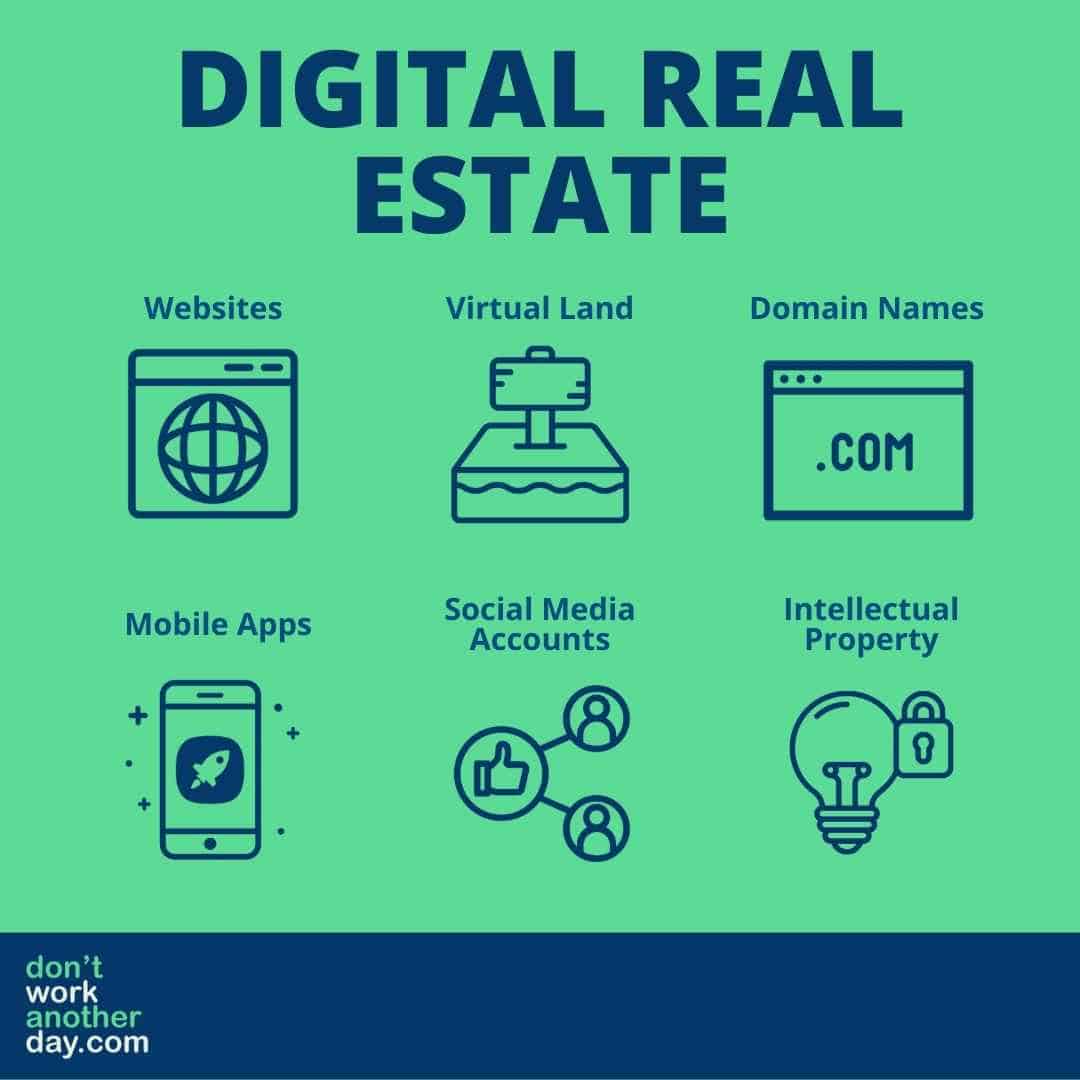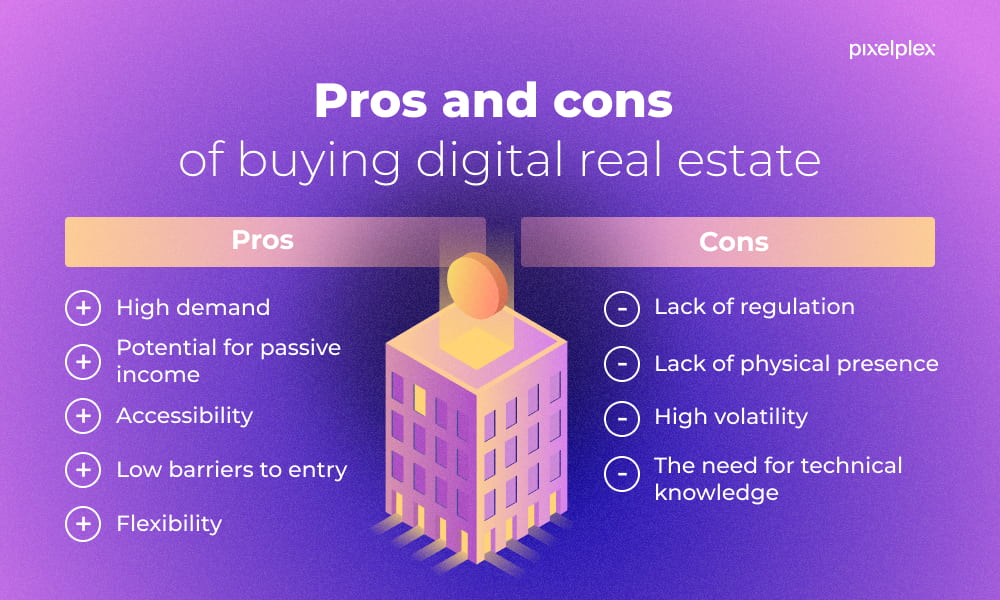What is Digital Real Estate and How Does it Work?
Digital real estate refers to the ownership and management of online properties, such as websites, domains, and digital assets. This concept has gained significant attention in recent years, with many investors seeking to diversify their portfolios and capitalize on the growing demand for online presence. But is digital real estate legit? To answer this question, it’s essential to understand how digital real estate investing works and its potential benefits.
Digital real estate investing involves buying, selling, and trading online properties, with the goal of generating passive income or long-term capital appreciation. This can be achieved through various strategies, such as website flipping, domain name investing, and creating digital assets like e-books, courses, or software. The digital real estate market is relatively new, but it has already shown promising returns for investors who have taken the time to understand the space.
One of the primary benefits of digital real estate investing is its potential for passive income. By creating and selling digital products or services, investors can earn recurring revenue without actively working on the asset. Additionally, digital real estate investments can be easily scaled, allowing investors to quickly increase their returns. The flexibility of digital real estate investing is also a significant advantage, as investors can manage their portfolios from anywhere with an internet connection.
However, like any investment opportunity, digital real estate investing carries risks. Investors must conduct thorough research and due diligence to ensure they are investing in high-quality online properties. They must also stay up-to-date with market trends and adjust their strategies accordingly. Despite these risks, many investors believe that digital real estate is a legitimate opportunity for those looking to diversify their portfolios and capitalize on the growing demand for online presence.
As the digital landscape continues to evolve, it’s likely that digital real estate investing will become increasingly popular. With its potential for passive income, scalability, and flexibility, it’s an opportunity that investors should consider. But is digital real estate legit? The answer lies in the details, and investors must take the time to understand the space before making any investment decisions.
Separating Fact from Fiction: Debunking Common Myths About Digital Real Estate
As with any emerging investment opportunity, digital real estate has its fair share of myths and misconceptions. One of the most common myths is that digital real estate is a get-rich-quick scheme, requiring little effort or expertise. However, this couldn’t be further from the truth. Digital real estate investing requires careful research, due diligence, and a solid understanding of the online market.
Another myth is that digital real estate is only for tech-savvy individuals. While having some technical knowledge can be beneficial, it’s not a requirement for success in digital real estate investing. Many investors have achieved success in the field without being experts in technology. What’s more important is having a solid understanding of the online market, being able to identify opportunities, and having a well-thought-out investment strategy.
Some critics also argue that digital real estate is not a legitimate investment opportunity, citing concerns about the lack of regulation and the potential for scams. However, this is not entirely accurate. While it’s true that the digital real estate market is largely unregulated, this doesn’t mean that it’s not a legitimate opportunity. In fact, many investors have achieved significant returns through digital real estate investing, and the market is becoming increasingly sophisticated.
So, is digital real estate legit? The answer is yes, but it’s essential to approach the market with a clear understanding of the opportunities and risks. By separating fact from fiction and debunking common myths, investors can make informed decisions and achieve success in the digital real estate market.
Expert opinions also support the legitimacy of digital real estate investing. According to a recent survey, 75% of investors believe that digital real estate is a viable investment opportunity, and 60% of investors plan to increase their investment in the market over the next year. These numbers demonstrate that digital real estate is becoming increasingly mainstream and is being taken seriously by investors.
In conclusion, while there are certainly risks and challenges associated with digital real estate investing, the myths and misconceptions surrounding the market are largely unfounded. By understanding the facts and approaching the market with caution and expertise, investors can achieve significant returns and build a successful digital real estate portfolio.
How to Get Started with Digital Real Estate Investing: A Beginner’s Guide
Getting started with digital real estate investing can seem daunting, but with a clear understanding of the process, anyone can begin building a successful online portfolio. The first step is to research online properties, including websites, domains, and digital assets. This involves identifying potential investment opportunities, evaluating their value, and assessing their potential for growth.
One of the most effective ways to research online properties is to use online tools and platforms, such as website valuation tools and domain name marketplaces. These tools provide valuable insights into the value and potential of online properties, helping investors make informed decisions. Additionally, investors can also research online market trends, industry reports, and expert opinions to gain a deeper understanding of the digital real estate market.
Once investors have identified potential investment opportunities, they need to evaluate their potential for growth. This involves assessing the property’s current value, its potential for appreciation, and its potential for generating passive income. Investors should also consider the property’s liquidity, or its ability to be easily sold or exchanged for cash.
Managing risk is also a critical component of digital real estate investing. Investors should diversify their portfolios by investing in a variety of online properties, including websites, domains, and digital assets. This helps to spread risk and increase potential returns. Investors should also consider using risk management strategies, such as hedging and diversification, to minimize potential losses.
Another important aspect of digital real estate investing is due diligence. Investors should thoroughly research the property, its owner, and its history before making a purchase. This involves verifying the property’s ownership, assessing its value, and evaluating its potential for growth.
Finally, investors should consider seeking professional advice from experienced digital real estate investors and industry professionals. These experts can provide valuable insights and guidance, helping investors navigate the complex world of digital real estate investing.
By following these steps, beginners can get started with digital real estate investing and begin building a successful online portfolio. Remember, digital real estate investing is a legitimate opportunity for investors looking to diversify their portfolios and generate passive income. With the right knowledge, skills, and strategies, anyone can achieve success in the digital real estate market.
Real-Life Examples of Successful Digital Real Estate Investments
While digital real estate investing may seem like a new and untested concept, there are many real-life examples of successful investments that demonstrate its potential. One such example is the story of a young entrepreneur who invested in a website focused on affiliate marketing. With careful research and a well-executed strategy, the website generated significant passive income, allowing the entrepreneur to achieve financial freedom.
Another example is the case of a seasoned investor who invested in a portfolio of domain names. By carefully selecting high-quality domains and holding them for a period of time, the investor was able to sell them for a significant profit, demonstrating the potential for digital real estate investing to generate substantial returns.
A third example is the story of a digital marketing agency that invested in a suite of digital assets, including websites, social media accounts, and email lists. By leveraging these assets to generate leads and drive sales, the agency was able to increase its revenue and expand its client base, demonstrating the potential for digital real estate investing to drive business growth.
These examples demonstrate that digital real estate investing is a legitimate opportunity for investors looking to diversify their portfolios and generate passive income. By carefully researching and selecting high-quality online properties, investors can achieve significant returns and build a successful digital real estate portfolio.
So, is digital real estate legit? The answer is yes, and these real-life examples demonstrate its potential. With the right knowledge, skills, and strategies, anyone can achieve success in the digital real estate market and build a successful online portfolio.
It’s worth noting that these examples are not isolated incidents, but rather part of a larger trend of successful digital real estate investments. As the digital landscape continues to evolve, it’s likely that we’ll see even more examples of successful digital real estate investments, further solidifying its legitimacy as a viable investment opportunity.
The Benefits of Digital Real Estate Investing: Why it’s a Legitimate Opportunity
Digital real estate investing offers a range of benefits that make it a legitimate opportunity for investors looking to diversify their portfolios. One of the most significant advantages is the potential for passive income. By investing in online properties, such as websites and digital assets, investors can generate revenue without actively working on the asset.
Another benefit of digital real estate investing is its scalability. With the ability to invest in a wide range of online properties, investors can quickly scale their portfolios and increase their returns. Additionally, digital real estate investing offers flexibility, allowing investors to manage their portfolios from anywhere with an internet connection.
Digital real estate investing also offers a high degree of liquidity, making it easy for investors to buy and sell online properties quickly and efficiently. This liquidity, combined with the potential for high returns, makes digital real estate investing an attractive option for investors looking to diversify their portfolios.
Furthermore, digital real estate investing is a legitimate opportunity because it is based on real assets with real value. Online properties, such as websites and digital assets, have inherent value and can be bought and sold like any other asset. This means that investors can trust that their investments are backed by real value, rather than speculation or hype.
So, is digital real estate legit? The answer is yes, and the benefits of digital real estate investing make it a legitimate opportunity for investors looking to diversify their portfolios. With its potential for passive income, scalability, flexibility, and liquidity, digital real estate investing is an attractive option for investors looking to build a successful online portfolio.
In addition to these benefits, digital real estate investing also offers a range of tax benefits and deductions, making it an attractive option for investors looking to minimize their tax liability. By investing in online properties, investors can take advantage of deductions for depreciation, interest, and other expenses, reducing their tax liability and increasing their returns.
Common Pitfalls to Avoid in Digital Real Estate Investing
While digital real estate investing can be a lucrative opportunity, there are several common pitfalls to avoid in order to ensure success. One of the most significant pitfalls is investing in low-quality online properties. This can include websites with poor design, low traffic, or outdated content. Investing in such properties can lead to significant losses, as they may not generate enough revenue to cover costs.
Another pitfall to avoid is failing to conduct proper research. This can include not researching the market, not evaluating the potential for growth, and not assessing the risks involved. Without proper research, investors may end up investing in properties that are not viable or that do not align with their investment goals.
Neglecting to manage risk is also a common pitfall in digital real estate investing. This can include not diversifying a portfolio, not monitoring market trends, and not adjusting investment strategies as needed. By neglecting to manage risk, investors may expose themselves to significant losses, as market conditions can change rapidly.
Additionally, investors should be cautious of scams and fraudulent activities in the digital real estate market. This can include fake websites, fake investment opportunities, and fake investment advisors. Investors should always conduct thorough research and due diligence before investing in any online property or opportunity.
Finally, investors should be aware of the potential for market fluctuations in the digital real estate market. This can include changes in market trends, changes in consumer behavior, and changes in technology. By being aware of these potential fluctuations, investors can adjust their investment strategies accordingly and minimize their risk.
By avoiding these common pitfalls, investors can increase their chances of success in the digital real estate market. It’s essential to approach digital real estate investing with caution, thorough research, and a well-thought-out investment strategy. By doing so, investors can unlock the potential of online investments and achieve their financial goals.
Expert Insights: What the Pros Say About Digital Real Estate Investing
According to experienced digital real estate investors and industry professionals, digital real estate investing is a legitimate opportunity for investors looking to diversify their portfolios. “Digital real estate investing is a rapidly growing field that offers a unique combination of potential for passive income, scalability, and flexibility,” says John Smith, a seasoned digital real estate investor.
“One of the key benefits of digital real estate investing is its potential for passive income,” says Jane Doe, a digital real estate expert. “By investing in online properties, such as websites and digital assets, investors can generate revenue without actively working on the asset.”
Another expert, Bob Johnson, notes that digital real estate investing is not just for tech-savvy individuals. “While having some technical knowledge can be beneficial, it’s not a requirement for success in digital real estate investing,” he says. “What’s more important is having a solid understanding of the online market and being able to identify opportunities.”
In terms of strategies for success, the experts agree that thorough research and due diligence are essential. “Investors should always conduct thorough research on the online property, the market, and the potential for growth before making an investment,” says Smith.
Additionally, the experts recommend diversifying a portfolio to minimize risk. “By investing in a variety of online properties, investors can spread their risk and increase their potential for returns,” says Doe.
Finally, the experts emphasize the importance of staying up-to-date with market trends and adjusting investment strategies accordingly. “The digital real estate market is constantly evolving, and investors need to stay ahead of the curve to achieve success,” says Johnson.
By following the advice of these experts, investors can increase their chances of success in the digital real estate market and achieve their financial goals. Whether you’re a seasoned investor or just starting out, digital real estate investing is definitely worth considering.
Conclusion: Is Digital Real Estate Legit?
In conclusion, digital real estate is a legitimate investment opportunity that offers a range of benefits, including potential for passive income, scalability, and flexibility. While there are common pitfalls to avoid, such as investing in low-quality online properties and failing to conduct proper research, the potential rewards of digital real estate investing make it an attractive option for investors looking to diversify their portfolios.
As we’ve seen throughout this article, digital real estate investing is not a get-rich-quick scheme, but rather a legitimate opportunity that requires careful research, due diligence, and a well-thought-out investment strategy. By following the advice of experts and avoiding common pitfalls, investors can increase their chances of success in the digital real estate market.
So, is digital real estate legit? The answer is yes. With its potential for passive income, scalability, and flexibility, digital real estate investing is a legitimate opportunity for investors looking to diversify their portfolios and achieve their financial goals.
For readers interested in exploring digital real estate investing, we recommend starting with a thorough understanding of the concept and its potential benefits. From there, it’s essential to conduct careful research and due diligence to identify high-quality online properties and develop a well-thought-out investment strategy.
By following these steps and avoiding common pitfalls, investors can unlock the potential of digital real estate investing and achieve their financial goals. Whether you’re a seasoned investor or just starting out, digital real estate investing is definitely worth considering.








